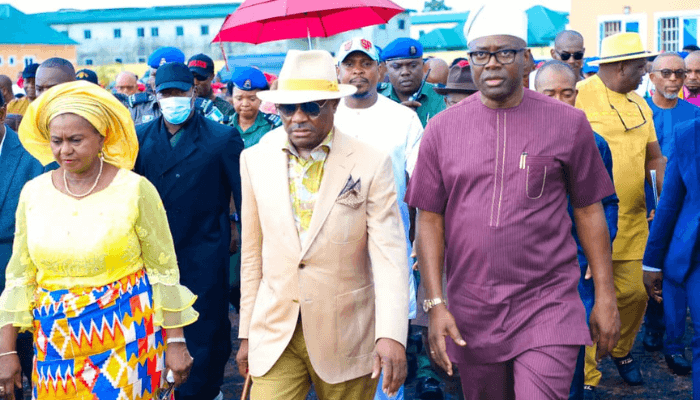The ruling All Progressives Congress (APC) is emerging as an unlikely beneficiary of the escalating feud between Nyesom Wike, former Rivers State governor and now minister of the Federal Capital Territory, and Seyi Makinde, governor of Oyo State.
The two men have drifted apart in a battle that is weakening the leading opposition party and shifting Nigeria’s political balance of power ahead of the 2027 general elections.
In 2022, Wike and Makinde stood shoulder to shoulder with three other PDP governors – Samuel Ortom (Benue), Ifeanyi Ugwuanyi (Enugu) and Okezie Ikpeazu (Abia) – to demand the resignation of Iyorcha Ayu, then PDP national chairman.
Their argument was simple: it was unfair for both the presidential candidate and the party chairmanship to remain in the North.
The G5 rebellion dominated headlines, with Wike as its loudest voice, hosting meetings in Port Harcourt and launching open attacks on party leaders who resisted their cause.
Makinde, though less fiery, provided legitimacy, being the only G5 governor seeking reelection.
Their solidarity created the image of governors united in principle, but that bond was short-lived.
Wike’s anger over losing both the PDP presidential and vice-presidential tickets in 2023 pushed him towards Bola Tinubu of the APC.
Read also: Anyone in APC free to challenge Tinubu in 2027, says Party
His support for Tinubu was pivotal in Rivers, where the APC made significant inroads, and in return, Wike was rewarded with the plum FCT ministerial portfolio.
Makinde, on the other hand, retained his PDP base in Oyo and was re-elected, but his alliance with Wike began to crack once Wike openly declared support for Tinubu’s re-election in 2027.
For Makinde, who harbours his own presidential ambitions, Wike’s pledge was nothing short of betrayal.
The feud has since spiralled. Wike has accused Makinde of deepening PDP’s crises, pulling out of reconciliation moves and reneging on their gentleman’s agreements.
Makinde, meanwhile, has tightened his grip on the PDP in the South-West.
The party’s recent decision to hold its national convention in Ibadan was widely interpreted as a victory for Makinde over Wike.
Tensions between their camps have played out in the tussle for party offices. Wike’s bloc backed Samuel Anyanwu, former Imo governorship candidate, for national secretary, while Makinde’s camp resisted.
Reconciliation efforts have collapsed, leaving the PDP fractured.
This week, the PDP’s National Executive Committee zoned its 2027 presidential ticket to the South-West, a move that boosts Makinde’s profile but further alienates Wike’s supporters.
For the APC, PDP’s internal strife could not be better timed.
APC’s gain
The ruling party has been quietly reaping defections from across states, with disillusioned PDP members streaming into its fold. Lawmakers, governors, and grassroots politicians frustrated by the endless feuds are swelling the APC’s ranks, giving the party added numerical strength in the National Assembly and state structures.
Recent defections in Kebbi, Delta, and the South-South have tilted the balance further in APC’s favour.
The ruling party’s strong showing in recent bye-elections has also been attributed, in part, to the PDP’s divisions.
The two men have drifted apart in a battle that is weakening the leading opposition party and shifting Nigeria’s political balance of power ahead of the 2027 general elections.
In 2022, Wike and Makinde stood shoulder to shoulder with three other PDP governors – Samuel Ortom (Benue), Ifeanyi Ugwuanyi (Enugu) and Okezie Ikpeazu (Abia) – to demand the resignation of Iyorcha Ayu, then PDP national chairman.
Their argument was simple: it was unfair for both the presidential candidate and the party chairmanship to remain in the North.
The G5 rebellion dominated headlines, with Wike as its loudest voice, hosting meetings in Port Harcourt and launching open attacks on party leaders who resisted their cause.
Makinde, though less fiery, provided legitimacy, being the only G5 governor seeking reelection.
Their solidarity created the image of governors united in principle, but that bond was short-lived.
Wike’s anger over losing both the PDP presidential and vice-presidential tickets in 2023 pushed him towards Bola Tinubu of the APC.
Read also: Anyone in APC free to challenge Tinubu in 2027, says Party
His support for Tinubu was pivotal in Rivers, where the APC made significant inroads, and in return, Wike was rewarded with the plum FCT ministerial portfolio.
Makinde, on the other hand, retained his PDP base in Oyo and was re-elected, but his alliance with Wike began to crack once Wike openly declared support for Tinubu’s re-election in 2027.
For Makinde, who harbours his own presidential ambitions, Wike’s pledge was nothing short of betrayal.
The feud has since spiralled. Wike has accused Makinde of deepening PDP’s crises, pulling out of reconciliation moves and reneging on their gentleman’s agreements.
Makinde, meanwhile, has tightened his grip on the PDP in the South-West.
The party’s recent decision to hold its national convention in Ibadan was widely interpreted as a victory for Makinde over Wike.
Tensions between their camps have played out in the tussle for party offices. Wike’s bloc backed Samuel Anyanwu, former Imo governorship candidate, for national secretary, while Makinde’s camp resisted.
Reconciliation efforts have collapsed, leaving the PDP fractured.
This week, the PDP’s National Executive Committee zoned its 2027 presidential ticket to the South-West, a move that boosts Makinde’s profile but further alienates Wike’s supporters.
For the APC, PDP’s internal strife could not be better timed.
APC’s gain
The ruling party has been quietly reaping defections from across states, with disillusioned PDP members streaming into its fold. Lawmakers, governors, and grassroots politicians frustrated by the endless feuds are swelling the APC’s ranks, giving the party added numerical strength in the National Assembly and state structures.
Recent defections in Kebbi, Delta, and the South-South have tilted the balance further in APC’s favour.
The ruling party’s strong showing in recent bye-elections has also been attributed, in part, to the PDP’s divisions.
